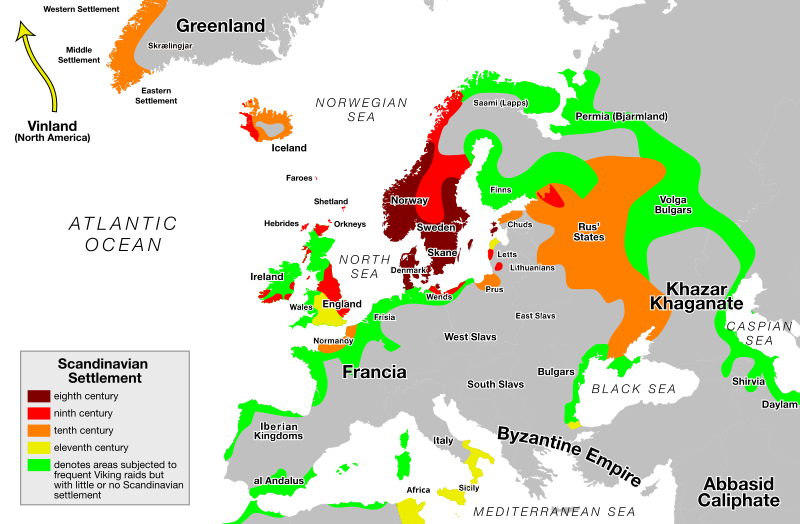Talk:Kievan Rus'/Kievan Rus' v Rus
HDI of Ukraine
The HDI of Ukraine is 0.729 not 0.710 which has been unchanged in the english version of the article for quite some time (In other languages, the article has been updated). It says so in the list of countries by HDI and also in the source. Please change, thanks. — Preceding unsigned comment added by 99.233.110.118 (talk) 07:02, 10 January 2012 (UTC)
 Done Thanks for catching that. (Shredder2012 (talk) 23:39, 24 January 2012 (UTC))
Done Thanks for catching that. (Shredder2012 (talk) 23:39, 24 January 2012 (UTC))
Ukraine or Kievean Rus?
The article is confusing. Has it always been called Ukraine or not? If not then the article should call it by its old name when discussing it in historical context as it confuses those of us who aren't that familiar with that region's history. MPA 11:18, 6 March 2011 (UTC) — Preceding unsigned comment added by MPA (talk • contribs)
- You may read Name of Ukraine
I fully agree with the above comment. All attempts to retrospective change of history make no good as to its objective understanding. I wonder how long some of modern nationalistic ukrainian history re-makers would have lived had they personally called any of old russian dukes "ukrainian". :D —Preceding unsigned comment added by 159.148.5.4 (talk) 22:40, 22 March 2011 (UTC)
- I think you are modern russian nationalist;) Volodimirg (talk) 13:35, 23 March 2011 (UTC)
This is a problem. There is considerable confussion which was casued after Peter I made the the Moscovites adopt the ethnonym Russian for self identification. Ruthenians were now constantly confused being with Moscovites, and Ruthenian language consused with Moscovite language because of its similarlity in look and sound with Russian. Indeed, in Shevchenko's poetry writings he never uses the term Ukraininian as an ethnonym, he always uses the ethnonym Kozak for Ukrainian, and Moscovite for Russian, although he uses the term Ukraine often in the geographic sense. This confusion which was brought on by Peter I is the main reason why the Ruthenians adopted the ethnonym Ukrainian. I for one would welcome the return to the old usage of the ethnonyms, with Russian changed back to Moscovite, and Ukrainian back to Ruthenium, however I do not think that is possible in todays society. It would be expensive, and confusing. So in order to avoid further confusion I guess we have to stick with Ukrainian. Bandurist (talk) 16:20, 23 March 2011 (UTC)
- What is your original,historical source(chronicle, document et cet.) about Peter I making the Moscovites adopt the ethnonym "Russian"?
The people of Great Russia("Great" in the sense of being the north part of Ancient Rus, with Little and White Russia being the other two parts) have always identified themselves as Russians, with term "Moscovites" being used occasionally as a replacement for "Rus" in 16-17 centuries by some with the aim either to estrange parts of previoulsy united Rus or to minutely identify dwellers around Moscow.The other reason for occasianl usage of term " Moscovites" was the fact that in 16 century, only north part of ancient Rus was an independent state, with Little Russia( modern-day ukraine) and White Russia ( belarus) being under foreing control. Before Peter I many tzars including Ivan the Terrible, were officially called "Grand dukes of Rus". Virtually all ancient chronicles, both russian and foreign, used term " Russian" with regard to people of today's north-western Russia.
Extract from Middle Ages chronicle of Livonia of Baltazar Russow regarding Livonian war:"Russians are very steady as to defending fortresses;if they have flour and vodka they'll stand to the last man." —Preceding unsigned comment added by 159.148.5.4 (talk) 05:57, 25 March 2011 (UTC)
- So far I cannot make head or tail over what is being said is wrong with the articles.
- The history of Ukraine is about the land that Ukraine occupies and the people who identify themselves as Ukrainian. A continuous link going back through the people who lived in the land can be traced all the way back to the Cucuteni. One kingdom that existed in this land in the past were the Kievan Rus'.
- How is this changing history? If anything it clearly shows the ancestry of a majority of the eastern Ukrainians as well as some Russians. Please try and explain what you have issues with. Chaosdruid (talk) 16:37, 23 March 2011 (UTC)
The term "Kyivan Rus" has political implications. The state was known as Rus' without the modifier "Kyivan" in its various forms. This was added later by Muscovite historians for political reasons. Bandurist (talk) 18:03, 23 March 2011 (UTC)
- @Bandurist - Please do not modify the page until consensus has been found, if the most common usage is Kievan Rus then there is no justification to change it.
- There is also the problem that the Kievan Rus page is still called that, it makes no sense to be making massive changes to the history of Ukraine without making sure that is the correct name. Chaosdruid (talk) 21:54, 23 March 2011 (UTC)
- For example I am trying to read Magosci to start with and then move to some other books on the history - it would help if we can first establish what constitutes "good reading material" from which we can determine the most appropriate course of action to take.
- If the term Kievan Rus is going to be changed to Rus, it must be determined for all articles, and that is such a massive impact on the Ukraine articles we cannot end up with edit warring over page moves and suchlike as it will have a greatly detrimental impact if consensus is not found first. Chaosdruid (talk) 22:07, 23 March 2011 (UTC)
- This piece of land has been through many conquests, border disputes, name changes and legal decrees from various governing bodies. Every new conqueror wants to rewrite history and erase the old one. Today, it is a country called Ukraine. Kievan Rus was a place in history with different borders than modern day Ukraine, and has a place in history in modern day Ukraine, Russia and Belarus. At the time of Kievan Rus, Ukraine was a region at the edge. Rus and Kievan Rus were also different things at different times. Primary Chronicle is a good source and available in major libraries in English. USchick (talk) 03:15, 24 March 2011 (UTC)
- Unfortunately this is getting out of hand very quickly, similar edits seem to be being made at all Kievan Rus', Rus and history of Ukraine articles: dropping "Kievan Rus'" to "Rus", removing East Slav, adding "Norse" and removing Scandinavian, claiming different religions and languages - it really needs to be discussed in one central location, a consensus found and then for all the articles to correctly reflect the consensus (which may need to be given more than 24 hours to allow a reasonable amount of editors to both find and weigh in on the discussion) Chaosdruid (talk) 13:42, 24 March 2011 (UTC)
- This piece of land has been through many conquests, border disputes, name changes and legal decrees from various governing bodies. Every new conqueror wants to rewrite history and erase the old one. Today, it is a country called Ukraine. Kievan Rus was a place in history with different borders than modern day Ukraine, and has a place in history in modern day Ukraine, Russia and Belarus. At the time of Kievan Rus, Ukraine was a region at the edge. Rus and Kievan Rus were also different things at different times. Primary Chronicle is a good source and available in major libraries in English. USchick (talk) 03:15, 24 March 2011 (UTC)
I will say - Kievan Rus. And, they know why CraigMurray3 (talk) 16:59, 27 February 2014 (UTC)
This "civil war-like conditions" are not news for Euro Union. Since 2008, Russia Consulate operate in Brussels, capital of a political party <Jeguminisation and Ariadna Kievan Rus>. The party president, presidential candidate in the future via the Ukraine, has discussed with Politikere place of everything. There were several manifestations and Mitingen to support the modernization of the state border of Ukraine. Now. Military forces are on the stuff.
Martelli22 (talk) 11:46, 3 March 2014 (UTC)
White House means white Politic. Also in question or Kiev Kievan Rus. Future via President Kievan Rus are ye were several years on food subsidies U.S. Baptists .BlueBonet (talk) 11:51, 17 March 2014 (UTC)
Rus' or Kievan Rus'
- As this is of high importance to all the Ukraine articles I have made a new talk page here and transcluded this discussion to Talk
- Ukraine, Talk:Kievan Rus' and the Ukraine portal. That way we can try and eliminate much of the duplication on all the talk pages.
The term Kievan before Rus' has an anti-scientific genesis.
Note that "Kievan Rus" and "Old Russia" or "Rus-Ukraine" - are all terms that originated in the imagination of researchers and scientists. Contemporaries called this state "Ruthenian land" or "Rus'". According to researchers, the term "Kievan Rus" arose in the bosom of the official historiography of Moscow and St. Petersburg, which was represented primarily works of Karamzin, S. Soloviev, V. Klyuchevskaya and other prominent historians of the Russian Empire. It is known that they defended the concept of genealogical continuity over time the ruling princely family in Moscow [1]. From the second half of the nineteenth century the term became popular in the history that has grown sharply in the intellectual debate on historiography of the state. So, the term "Kievan Rus" originates not from the sources and historical works but from the pages of the imperial era. During this period the historiography, literary aspects of amateurs approached into a serious science, which began to explore the important issues of national history of methodological, conceptual positions.
More can be read from Anatoliy Pavko's article: Інститут державної влади Київської Русі в контексті політичних процесів сьогодення - Серед питань становлення та розвитку Київської Русі найважливішим є історичний досвід формування та функціонування інститутів політичної влади Давньоруської держави. [[1]] You can run it through google translate.Bandurist (talk) 16:59, 24 March 2011 (UTC)
- Bandurist, we'll take your word for it. :-) According to the Russian Federation got its beginnings in what is modern day Kiev, Ukraine. Also, there are other sources that claim different things, depending on what nation is telling the story from their own historical perspective. Please discuss your changes. If Ruthenians called it something, I hope they lived long enough to write it down so we can use it here as a reference. It's great to have a historian contributing to this article, thank you for your contribution! USchick (talk) 17:23, 24 March 2011 (UTC)]
- Just a small note from you statement above. It should not be Russian lands but Rus' lands. If you (incorrectly) state that it was "Kievan Russia", then it is easy to infer that the continuation of this state was Russia and then also the the Russian Federation. However this is not so. It is a minor difference, but a valid one, comparible to using other imperialist terms inaccurately. Bandurist (talk) 17:13, 28 April 2011 (UTC)
- I understand the problem you have with the usage of the term Kievan Rus'. If you are correct then the page will have to be moved as long as the term Kievan Rus' is NOT the most common name for it.
- As this will affect all Ukrainian pages that deal with history and the infoboxes we need to really be careful that this is the best thing to do here. If it is there will be a lot of work to do to make all pages the same and remove the Kievan from them all.
- I do not doubt tht what you say is correct, but I need to see it for myself and to find consensus from everyone on the matter, If we cannot get agreement we may need to start a wider discussion or maybe even an RfC on it.
- I propose this course of action:
- Discuss here to find consensus on keeping/changing
- If we find consensus, start a requested page move "Kievan Rus' ->" Rus to widen the discusion
- If the result is to move, then we need to assemble a list of pages that will be affected
- Once assembled we will need to change them all with a linkback to the move discussion and note it all on the Ukraine portal and talk pages.
- If we can just get an agreement on this course of action first, by signing here and yes no, then I think we can proceed. Chaosdruid (talk) 10:47, 25 March 2011 (UTC)
Can someone please clarify what is in question?
Proposal to proceed
- Support As nominator Chaosdruid (talk) 10:47, 25 March 2011 (UTC)
- Don't understand what the problem is or what is being suggested. Can someone elaborate? Deacon of Pndapetzim (Talk) 22:10, 25 March 2011 (UTC)
- The problem is that there is a claim by Bandurist and others that the term "Kievan Rus'" is incorrect and was made up by Russian sources. The editors also claim that the term should be "Rus" and that all mention of "Kievan Rus'" should be changed to "Rus" in all articles. I am suggesting that we discuss this and decide whether such a massive change is to be made before the articles are all changed. Chaosdruid (talk) 21:07, 26 March 2011 (UTC)
- Oh, ok. That move won't happen. The era is called Kievan Rus because that is the time when Rus/Russia was dominated by Kiev (as opposed to Moscow),. It is just a historiographic convention, and has been used since before English writers thought of Ukraine and Belarus as not Russia. In my experience patriotic Ukrainians are usually not OK with "Kievan Russia" but don't mind "Kievan Rus", even though the words have the same historic meaning. Deacon of Pndapetzim (Talk) 22:21, 26 March 2011 (UTC)
- The problem is that there is a claim by Bandurist and others that the term "Kievan Rus'" is incorrect and was made up by Russian sources. The editors also claim that the term should be "Rus" and that all mention of "Kievan Rus'" should be changed to "Rus" in all articles. I am suggesting that we discuss this and decide whether such a massive change is to be made before the articles are all changed. Chaosdruid (talk) 21:07, 26 March 2011 (UTC)
There is a difference between the terms Kievan Rus' and Kievan Russia. The distinction is mnor but it is there none the less. Bandurist (talk) 17:06, 28 April 2011 (UTC)
East Slavic tribes as founders of Kievan Rus
Why does the intro say that Kievan rus was founded by East Slavic tribes. It doesnt correlate very well with the article. I've tried to fix it but then User talk:Chaosdruid threatens to ban me... Alphasinus (talk) 12:13, 25 March 2011 (UTC)
- According to the article, it was founded by Scandinavian warriors. Slavic tribes lived there, along with lots of other people. USchick (talk) 17:57, 25 March 2011 (UTC)
- I did not threaten to ban you, I cannot ban you. There is a procedure called WP:3RRwhich is a rule to prevent edit warring which says that we cannot have 3 reverts in a 24 hour period.
- The thing is you need to find consensus by convincing me and other editors that what you are saying is correct, preferably by posting some links here that show your claims to be accurate.
- To write the east slavs out of the formation of the Rus is quite a large change. At the moment it seems that you are claiming the "Norse" people, previously we had Varangians, came along and formed a state here without the slavic population having anything to do with it. Previously it was accepted that the article stated that the east slavs formed a state and the varangians were invited to rule. ::I advise you to prove what you are saying by making some posts of text from books or links to sites which support your claims Chaosdruid (talk) 21:04, 26 March 2011 (UTC)
- I did not threaten to ban you, I cannot ban you. There is a procedure called
- The material you are changing to has no sources, is unreferenced and is dubious, please provide proof here before changing again.
- Avoiding WP:BRD is not going to get us anywhere and the edit warring is not going to achieve anything apart from making even more problems. Chaosdruid (talk) 21:21, 26 March 2011 (UTC)]
- From the Encyclopaedia Britannica:
- "According to tradition, the Slavs of Novgorod, tired of political turmoil, invited the Varangian prince Rurik to rule the city. He arrived in about 862 and established the dynasty that ruled various parts of East Slavic territory until 1598. After Rurik's death his relative Oleg became ruler of Novgorod and in 882 added Kiev to his domains, making it his capital. This was the beginning of Kievan Rus, the first East Slavic state." Chaosdruid (talk) 21:47, 26 March 2011 (UTC)
(from my talk page)
East Slavic founders of Kievan Rus
Please get a source before you insert claims that
- "Slavic tribes occupied central and eastern Ukraine in the sixth century A.D. and played an important role in the establishment of Kyiv. Kievan Rus Prince Volodymyr converted the Kievan nobility and most of the population to Christianity in 988. Situated on lucrative trade routes, Kyiv quickly prospered as the center of the powerful state of Kievan Rus. In the 11th century, Kievan Rus was, geographically, the largest state in Europe. Conflict among the feudal lords led to decline in the 12th century. Mongol raiders razed Kyiv in the 13th century." from [2] --Taivo (talk) 22:42, 26 March 2011 (UTC)
The four tribes who had been forced to pay tribute to the Varangians —
The Primary Chronicle[1]
I would be careful using the United States government as a source since they would probably leave out information that could be of potential poltical dispute. As far as i know, the
- Actually, the Primary Chronicle is not a reliable source since it is a primary document, not a secondary source. Thus, while the US government document isn't the best source, it is considered a tertiary source, based on secondary sources. Thus, the Wikipedia hierarchy for quality of sources is 1) secondary source (preferably scholarly), 2) tertiary source (based on secondary sources), 3) primary source. The point is that the role of the non-Slavic Varangians is debatable. While they were involved, their relative level of involvement is in dispute. While you caution about the use of a government document, you use one as well--the Primary Chronicle is, in essence, the official propaganda of the Kievan regime. To quote the Wikipedia entry on the Primary Chronicle: "Nestor worked at the court of Sviatopolk II of Kiev and probably shared his pro-Scandinavian policies." So you choose your propaganda. Find a scholarly source. --Taivo (talk) 02:48, 27 March 2011 (UTC)]
- Actually, the Primary Chronicle is not a primary source because it was compiled by monks from much older sources. It is one of the oldest historical documents available, and it does reflect history from the lens of the people writing it. However, together with other historical documents, it's a much better source than what the modern scholars have been able to come up with. USchick (talk) 16:23, 27 March 2011 (UTC)
- Non-Slavic people in this region were nomadic in nature, and much less likely to write their history, since the only people allowed to write were Christian monks. Everyone else attempting to write at that time were killed. What scholarly source wouldn't be considered propaganda? I think the best we can do in this case is go with the policy of: making sure that all majority and significant minority views that have appeared in reliable, published sources are covered. USchick (talk) 19:15, 27 March 2011 (UTC)
- Actually, the Primary Chronicle is not a primary source because it was compiled by monks from much older sources. It is one of the oldest historical documents available, and it does reflect history from the lens of the people writing it. However, together with other historical documents, it's a much better source than what the modern scholars have been able to come up with. USchick (talk) 16:23, 27 March 2011 (UTC)
Greek
When the Varangians first appeared in
Frankish
The Annals are notable, among other things, for containing one of the earliest written references to a group of
Arab
The Arab diplomat and traveller, Ahmad ibn Fadlan, who visited Volga Bulgaria in 922, described the Rus (Rusiyyah)
I have seen the Rus as they came on their merchant journeys and encamped by the Itil. I have never seen more perfect physical specimens, tall as date palms, blond and ruddy; they wear neither tunics nor caftans, but the men wear a garment which covers one side of the body and leaves a hand free. Each man has an axe, a sword, and a knife, and keeps each by him at all times. The swords are broad and grooved, of Frankish sort. Each woman wears on either breast a box of iron, silver, copper, or gold; the value of the box indicates the wealth of the husband. Each box has a ring from which depends a knife. The women wear neck-rings of gold and silver. Their most prized ornaments are green glass beads. They string them as necklaces for their women.
— Gwyn Jones, A History of the Vikings[3]
Persian
As for the Rus, they live on an island ... that takes three days to walk round and is covered with thick undergrowth and forests; it is most unhealthy.... They harry the Slavs, using ships to reach them; they carry them off as slaves and…sell them. They have no fields but simply live on what they get from the Slav's lands.... When a son is born, the father will go up to the newborn baby, sword in hand; throwing it down, he says, "I shall not leave you with any property: You have only what you can provide with this weapon."
— Ibn Rustah, National Geographic[4]
Finnic
Sweden is called [Ruotsi|http://fi.wikipedia.org/wiki/Ruotsi] in Finnish.
Baltic
Sweden is called [Rootsi|http://et.wikipedia.org/wiki/Rootsi] in Estonian.
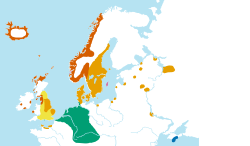
Merged with kiev culture
- Zarubintsy culture
- Azov Sea in Ukraine, 5th millennium BC.[5] The earliest known chariot was discovered at Krivoye Lake and dates to c. 2000 BC.[6]
Nomadic tribes in the area
Scythians
For Herodotus, the Scythians were outlandish barbarians living north of the Black Sea in what are now Moldova and Ukraine. (Michael Kulikowski, Rome's Gothic Wars from the Third Century to Alaric, pg. 14)
Herodotus wrote about an enormous city, Gelonus, in the northern part of Scythia[7] "The Budini are a large and powerful nation: they have all deep blue eyes, and bright red hair. There is a city in their territory, called Gelonus."
Excavations near the village of
Sarmatians
The descendants of the Sarmatians became known as the
Pecheneg

Oghuz
Kipchak
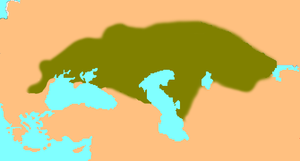
Cuman
Mongol Empire
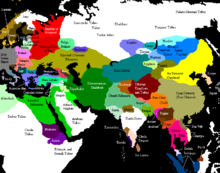
The
.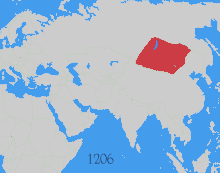
Cleanup effort
Yes, look, this is an article in really bad shape, that linked to terms like stepmother and squabble. In other words, it needs attention and a firm hand from good editors who don't pay attention to the trolling re Normanist vs. anti-Normanist, Russian historians vs. non-Russian historians, yadda
We should treat this britney crespo like any other nationalist-infested topic, reserve a section for "in modern nationalism" and stuff all the disputes in there, clearing the air for writing an article about the actual historical topic. --
By way of explanation, this is a major
- The problem here is getting the facts right, keeping POV out and ensuring that things are correctly represented as per sources.
- As I understand it, the facts of the matter are that the people that lived there established states which fell into disarray with constant warring and they invited the Rus in to rule them and provide leadership which made everything flourish. It was not, as it seems to read now, as if the Rus came in and conquered everybody and started the states on their own.
- This situation has to be correctly written about and we should not tolerate anything which detracts from the sourced facts or introduces POV bias. Chaosdruid (talk) 12:26, 28 April 2011 (UTC)
Coined by Karamzin
The article claims that The name "Kievan Rus'" (Ки́евская Русь) was coined by Nikolai Karamzin. This is possible, but unreferenced. It is also suspicious, because in this copy of Karamzin's "History of Russia", the term is conspicuously absent. Karamzin talks about Русь "Kiev" simply, and about "Varagian-Rus", but never about a "Kievan Rus". --
Been quiet here for quite a while
I'd just mention that Kievan Rus', Kievan Rus, Rus, Kievan Russia, Kiev State, Kievan State are all used in sources to describe the state in question (let's center on mid-11th century although its tenure was much longer and significantly varied in territorial control). VєсrumЬа ►TALK 01:14, 1 June 2013 (UTC)
- ^ The Primary Chronicle, 879–902.
- ^ I. H. Garipzanov, The Annals of St. Bertin (839) and Chacanus of the Rhos. Ruthenica 5 (2006) 3–8 sides with the old theory (http://www.history.org.ua/JournALL/ruthenica/5/1.pdf).
- ISBN 0-19-280134-1.
- Rustah, Ibn (1985). National Geographic.)
{{cite news}}: Missing or empty|title=(help); Unknown parameter|month=ignored (help - ^ Cite error: The named reference
blenchspriggsIII181was invoked but never defined (see the help page). - ^ Anthony & Vinogradov (1995)
- ^ Herodotus 4.108 trans. Rawlinson.
- ^ [4]
- ^ James Minahan, "One Europe, Many Nations", Published by Greenwood Publishing Group, 2000. pg 518: "The Ossetians, calling themselves Iristi and their homeland Iryston are the most northerly Iranian people. ... They are descended from a division of Sarmatians, the Alans who were pushed out of the Terek River lowlands and in the Caucasus foothills by invading Huns in the fourth century A.D.
- Caspian expeditions.
- ^ Hupchick, D. The Balkans. Palgrave, 2002, p. 62.

